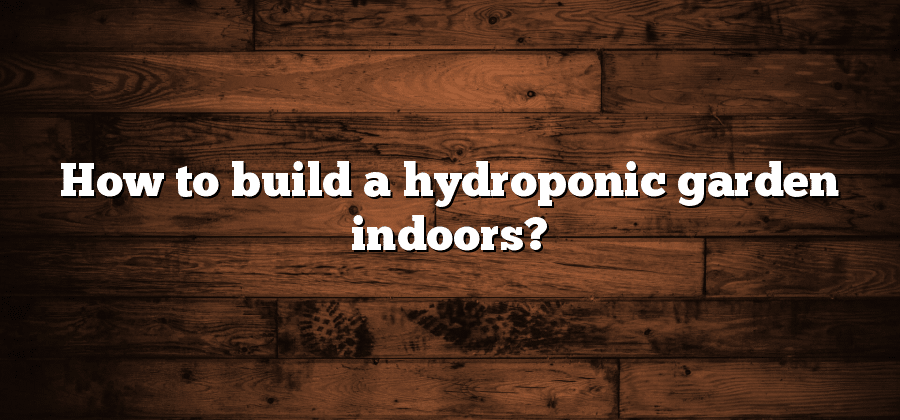Benefits of Indoor Hydroponic Gardens
Hydroponic gardening has gained significant popularity in recent years, and for good reason. One of the key benefits of indoor hydroponic gardens is that they allow for year-round cultivation of a wide variety of plants, regardless of the external climate conditions. Unlike traditional soil-based gardening, hydroponics eliminates the need for fertile soil, making it suitable for apartment dwellers and those with limited outdoor space. Additionally, indoor hydroponic gardens can be easily set up and managed, requiring less time and physical effort compared to conventional gardening methods.
Another advantage of indoor hydroponic gardens is the precise control they offer over the growing environment. By carefully monitoring factors such as temperature, humidity, and lighting, hydroponic gardeners are able to create optimal conditions for plant growth. This level of control results in higher and faster yields, as well as healthier plants with increased nutrient content. Furthermore, indoor hydroponic gardens are less prone to pests and diseases, as they eliminate the risk of exposure to soil-borne pathogens.
Choosing the Right Location for Your Indoor Hydroponic Garden
When it comes to setting up an indoor hydroponic garden, one of the most crucial considerations is selecting the right location. The success of your garden will greatly depend on the environment in which it is placed. Ideally, you will want to choose a location that receives ample natural light throughout the day. The more sunlight your plants can receive, the better they will grow and thrive. However, if natural light is limited, you can also opt for using artificial grow lights to provide the necessary light spectrum for optimal plant growth.
Another important factor to consider when choosing a location for your indoor hydroponic garden is the availability of space. It is essential to have enough room to accommodate your plants, containers, and all the necessary equipment. Ensure that the area you choose is well-ventilated to promote proper air circulation and help prevent the buildup of excess humidity, which can lead to issues such as mold or mildew. Additionally, consider the proximity to a water source, as you will need a convenient way to supply your hydroponic system with water and nutrient solutions.
Essential Equipment and Supplies for Indoor Hydroponic Gardening
Indoor hydroponic gardening requires a few essential equipment and supplies to ensure successful plant growth and optimum results. Of course, the first item you will need is a suitable hydroponic system. There are various types available, including nutrient film technique (NFT), deep water culture (DWC), and ebb and flow systems. Each system has its own advantages, so it’s important to choose one that fits your space, budget, and the type of plants you intend to grow. Additionally, you will need a grow light to provide the necessary light energy for your plants. LED lights are often preferred due to their energy efficiency and ability to provide the ideal spectrum for plant growth. Alongside this, you will also need a timer to control the light cycle for your plants. Finally, don’t forget to invest in a reliable pH meter and a TDS meter to monitor the nutrient levels and acidity of your hydroponic solution.
Selecting the Best Hydroponic Systems for Indoor Gardens
Hydroponic systems are an essential part of any indoor garden setup. With the right system, you can ensure that your plants receive the necessary nutrients and water without relying on traditional soil. When selecting the best hydroponic system for your indoor garden, there are a few factors to consider.
Firstly, consider the size and space available in your indoor garden. Different hydroponic systems have different footprints and configurations, so it’s important to choose one that fits within your space constraints. Additionally, think about the number of plants you plan to grow. Some systems are better suited for small-scale operations, while others can accommodate larger plant volumes. By selecting a system that matches the size and scale of your indoor garden, you can optimize the growth and productivity of your plants.
Secondly, take into account your experience and expertise in hydroponic gardening. Some systems require more technical knowledge and maintenance compared to others. If you’re a beginner, it’s advisable to start with a simpler system that is easy to understand and manage. As you gain more experience and confidence, you can then explore more advanced hydroponic systems. By selecting a system that aligns with your skill level, you can ensure a successful indoor gardening experience.
Remember, the choice of the best hydroponic system for your indoor garden will greatly impact your plants’ growth, productivity, and overall success. Consider important factors such as size, space, and your own expertise to make an informed decision for your indoor hydroponic garden.
Understanding the Importance of Nutrient Solutions in Hydroponic Gardening
Hydroponic gardening is a method of growing plants without soil, using water-based nutrient solutions instead. In this system, nutrients are directly provided to the plants through the water, ensuring they receive the essential elements required for healthy growth. Understanding the importance of nutrient solutions in hydroponic gardening is crucial for successful and thriving indoor gardens.
Nutrient solutions play a vital role in hydroponic gardening as they provide plants with all the necessary minerals and nutrients they need to grow vigorously. Since there is no soil present to naturally provide these essential elements, it is up to the grower to create a balanced and tailored nutrient solution. This means carefully measuring and adjusting the nutrient concentrations to meet the specific requirements of each plant species. By providing the correct mix of nutrients, hydroponic gardeners can optimize plant growth, yield, and overall plant health.






